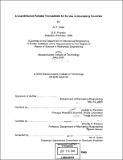A cost-effective portable telemedicine kit for use in Developing countries
Author(s)
Adler, Ari T. (Ari Tao), 1974-
DownloadFull printable version (10.07Mb)
Other Contributors
Massachusetts Institute of Technology. Dept. of Mechanical Engineering.
Advisor
Joseph A. Paradiso.
Terms of use
Metadata
Show full item recordAbstract
Telemedicine is currently being used to bridge the physical distance between patients in remote areas and medical specialists around the world. Developing countries have had little experience or success with telemedicine, in part because of the prohibitively expensive equipment and connectivity costs involved. Developing countries require low-cost, sustainable telemedicine solutions for the local delivery of primary healthcare and efficient access to medical expertise when needed. A low-cost (approximately $8,000 in small quantities) portable telemedicine kit was designed and built to address these needs. The kit was developed as part of the Little Intelligent Communities (LINCOS) project, which is bringing satellite telecommunications, education and telemedicine services to underserved areas of Latin America and the Caribbean. This is accomplished through the use of modified ISO shipping containers that become 'digital town centers.' The telemedicine kit consists of a durable case that houses a portable computer and several medical peripherals: a digital stethoscope, an ECG recorder and a medical imaging system. The kit allows a health practitioner in a remote area to capture patient data in the form of audio, video, and images in a asynchronous fashion and forward them over the Internet to a doctor for a diagnosis. This document addresses various aspects related to the implementation of a low cost telemedicine kit. It also explores some of the technologies that will enable the creation of new types of telemedicine devices in the future, not only for remote diagnostic applications, but also for home health monitoring. A wireless transceiver board was also designed and built so that it could be embedded into consumer medical and electronic devices in a general fashion. It allows the devices to communicate wirelessly with a base station either for home health monitoring applications, or for a cordless version of the portable telemedicine kit.
Description
Thesis (S.M.)--Massachusetts Institute of Technology, Dept. of Mechanical Engineering, 2000. Includes bibliographical references (p. 95-96).
Date issued
2000Department
Massachusetts Institute of Technology. Department of Mechanical EngineeringPublisher
Massachusetts Institute of Technology
Keywords
Mechanical Engineering.